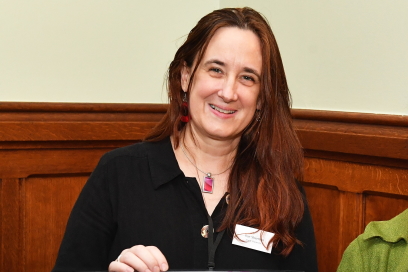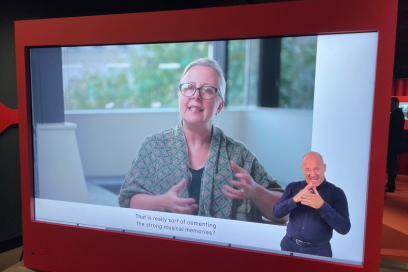Health, well-being and behaviour change
Psychological approaches to understanding health and illness and promoting wellbeing.
The group focuses on a broad range of topics related to health and wellbeing. It bridges the gaps between applied research and psychology by exploring how people experience and can be supported in handling a range of health and wellbeing-related issues. Staff also work in an interdisciplinary way, influenced variously by social psychology, cognitive psychology and music psychology to name a few. Research interests include the role of the arts and leisure activities in health and wellbeing, health screening and vaccinations, health literacy in different populations, health behaviours, maternal health, ageing and intergenerational practice. The group encompasses a range of different methodological approaches, including quantitative and qualitative and participatory techniques.
For further information about the Health and Wellbeing Research Group, please contact Research Group Lead, Dr Sue Sherman.
For more information about individual staff interests, please see below:
| Dr Huseyin Cakal |
Huseyin examines the impact of intergroup processes such as contact and social identity on mental health among the severely disadvantaged populations, e.g. refugees and indigenous tribes, mostly in the global south. |
| Dr Alexandra Kent |
Alexandra studies how we seek, and provide, assistance and support in different contexts. She is focusing on new mothers’ experiences of accessing support, particularly around breastfeeding. Her work will explore public discourses around breastfeeding, one-to-one consultations for breastfeeding support, and how health professionals are trained to advise new mothers around breastfeeding. |
| Professor Alexandra Lamont |
Alexandra's research focuses on the role of music in wellbeing, music and emotion, and inclusion in music, using a diversity of innovative research methods. Current projects include the role of music in autobiographical memory across the lifespan, the effects of donating musical instruments on wellbeing and identity, and the language used to describe music and emotion in everyday contexts. |
| Professor Abigail Locke |
Abigail Locke is a Critical Social and Health Psychologist. Her research expertise focuses on issues around identities, gender, parenting and communications. She researches, and has published on, a wide range of topics including stay-at-home-dads, mothering identities, infant feeding (including breastfeeding and weaning), advice to parents, digital and media representations. Abigail uses advanced qualitative research methodologies to approach her work and has particular expertise in Critical Discursive Psychology. |
| Dr Alexander Scott |
Alex is a Health Psychologist primarily interested in the role sleep plays in the experience of mental health difficulties and the impact of sleep on wider health behaviours. |
| Dr Sue Sherman |
Sue Sherman conducts research exploring barriers and facilitators to engaging with various protective health behaviours such as vaccination (eg COVID, varicella and influenza). She is particularly interested in human papillomavirus (HPV), HPV vaccination and cervical screening and her research is conducted in collaboration with various stakeholders including charities, clinicians and patient representatives. Sue's research often focuses on health inequalities in the UK and internationally and explores the knowledge and experience of health care providers, women and people with a cervix, and parents, using both quantitative and qualitative research methods. Sue's research was the focus of one of the School's impact case studies for REF 2021. |
| Dr Chris Stiff |
Chris's work predominantly looks at the more positive aspects of social media and gaming, which have traditionally enjoyed a rather negative reputation. He examines how these facilities can be used to reduce prejudice, increase cooperation, and improve well-being of users. |
| Dr Katie Wright-Bevans |
Katie's work uses critical social psychological theories to understand health inequalities and identify avenues for individual and social change. She have worked with groups such as socially isolated older adults, disadvantaged young people, and sexual minorities. Katie draws on traditional and creative qualitative methods to understand social representations of health related issues. |
| Dr Jenny Cole |
Jenny's work concerns gender, health and the body. She is currently focusing on weight stigma in health contexts, particularly during pregnancy and new parenthood and is also interested in weight stigma as a barrier to effective healthcare. |
| PhD Students: | |
| Annabel Roberts | |
| Rebecca Jones | My research explores gynaecological diagnoses and potential reproductive implications with consideration for identity, social influence and mental health. It explores an often-neglected area of research within Women's Health whereby there is a level of uncertainty around reproductive future. I am in the very early stages of this PhD and look forward to the journey as it evolves. |
Selected group publications:
- Cakal, Altınışık, Gökcekuş, & Eraslan. (2022). Why people vote for thin-centred ideology parties? A multi-level multi-country test of individual and aggregate level predictors. PloS One 17 (3), e0264421.
- Kende, Psaltis, Reiter, Fousiani, Cakal, & Green (2022). Past and Present Intergroup Contact and Conflict Among Inhabitants of Former Mixed Villages of Cyprus: The Role of Individual and Collective Experiences in Predicting Attitudes. Political Psychology, 43 (4), 751-768
- Cole, J. M., Grogan, S., & Turley, E. (2021). “The most lonely condition I can imagine”: Psychosocial impacts of endometriosis on women’s identity. Feminism & Psychology, 31(2), 171–191.
- Kent, A., & Antaki, C., (2019) Police call-takers' use of their first substantive question to project the outcome of the call, Applied Linguistics
- Scott, A. J., Webb, T. L., Martyn-St James, M., Rowse, G., & Weich, S. (2021). Improving sleep quality leads to better mental health: A meta-analysis of randomised controlled trials. Sleep medicine reviews, 60, 101556.
- Lin, C. Y., Strong, C., Scott, A. J., Broström, A., Pakpour, A. H., & Webb, T. L. (2018). A cluster randomized controlled trial of a theory-based sleep hygiene intervention for adolescents. Sleep, 41(11), zsy170.
- Scott, A. J., Flowers, O., & Rowse, G. (2021). Do specific types of sleep disturbances represent risk factors for poorer health‐related quality of life in inflammatory bowel disease? A longitudinal cohort study. British Journal of Health Psychology, 26(1), 90-108.
- Wright, B., Tindall, L., Scott, A. J., Lee, E., Cooper, C., Biggs, K., ... & Marshall, D. (2022). One session treatment (OST) is equivalent to multi‐session cognitive behavioral therapy (CBT) in children with specific phobias (ASPECT): results from a national non‐inferiority randomized controlled trial. Journal of Child Psychology and Psychiatry.
- Sherman, S. M., Brewer, B., Bartholomew, K., Bromhead, C., Crengle, S., Cunningham, C., Douwes, J., Foliaki, S., Grant, J., Maxwell, A., McPherson, G., Scott, N., Wihongi, H., & Potter, J. D. (2022). Human Papillomavirus (HPV) self-testing among un- and under-screened Māori, Pasifika and Asian women in Aotearoa, New Zealand: a preference survey among responders and interviews with clinical trial non-responders. Health Expectations. 25(6):2914-2923. https://doi.org/10.1111/hex.13599
- Sherman, S. M.,* Smith, L.,* Sim, J., Amlot, R., Cutts, M., Dasch, H., Rubin, J., & Sevdalis, N. (2021). COVID Vaccine Acceptability Study: CoVAccS. Human Vaccines and Immunotherapeutics, 17, 1612-1621. https://doi.org/10.1080/21645515.2020.1846397 (*joint first authors)
- Hallett, R., & Lamont, A. (2019). Evaluation of a motivational pre-exercise music intervention. Journal of Health Psychology, 24(3), 309-320.
- Lamont, A., Murray, M., Hale, R. & Wright-Bevans, K. (2018). Singing in later life: the anatomy of a community choir. Psychology of Music, 46(3), 424-439.
- Cogo-Moreira, H., & Lamont, A. (2018). Multidimensional measurement of exposure to music in childhood: Beyond the musician/non-musician dichotomy. Psychology of Music.
- Stiff C. (2019) The Dark Triad and Facebook surveillance: How Machiavellianism, psychopathy, but not narcissism predict using Facebook to spy on others. Computers in Human Behavior.
- Stiff, C. & Kendra, P (2018). Playing well with others: The role of opponent and intergroup anxiety in the reduction of prejudice through collaborative video game play. Psychology of Popular Media Culture.
- Wright-Bevans, K. & Murray, M. (2018) Resisting negative social representations of ageing. In E. Peel, C. Holland & M. Murray (Eds.), Psychologies of Ageing: Research, Theory & Practice. London: Palgrave.
We offer a thriving and dynamic environment for both research and teaching excellence. We are proud of our high profile research activity, our external impact, and our strong portfolio of courses. We offer a portfolio of MSc Psychology courses which integrate well with our research themes.




